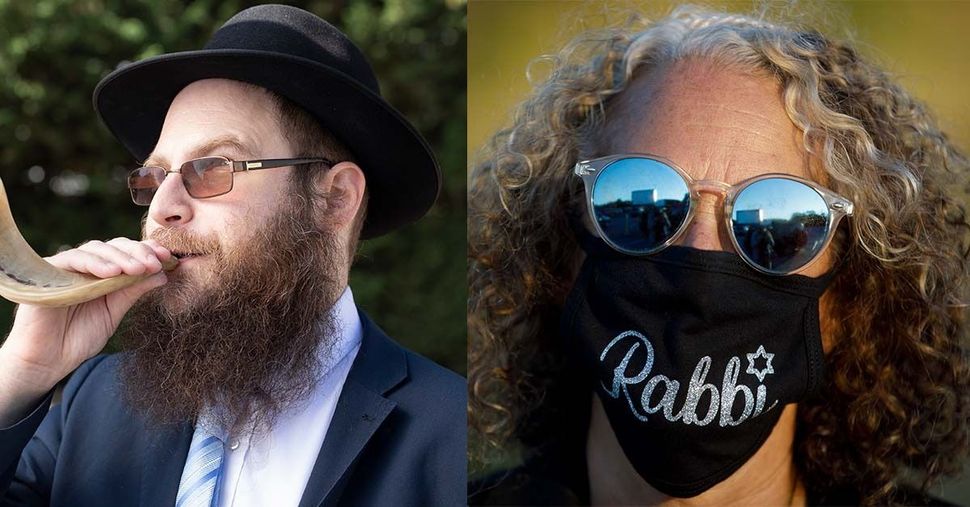Our rabbis, our heroes

An Orthodox rabbi in London, left blows a shofar during the pandemic. A female rabbi wears a mask that says “Rabbi.” By Getty Images
While many have enjoyed a restful summer, August was a blur for Jewish professionals. Most were locked inside offices, wondering how to hold the space for a liturgy that asks us “who shall live, and who shall die” while facing wildfires, hurricanes and a deadly pandemic that has decimated our communities.
Just as it seemed final task force meetings had reached safe conclusions, something would change again: variants arose, children were exposed, vaccinated adults became ill, local hospitals filled to capacity, or Jewish professionals themselves became sick.
I have had to do mental gymnastics that leave me with the twisties as I navigate the priorities of work and my own health and safety. Whether supporting couples on the pathway to marriage and beyond, shepherding teenagers enroute to b’nai mitzvah, or standing graveside with grieving mourners, I pray that the power of our Jewish rituals will overcome the fact that my emotions and efforts can’t be seen beneath my KN95.
Being a clergyperson, educator or Jewish professional these days involves working tirelessly to support your community while trying, in your “spare time,” to take care of yourself and your family. They are no less than astonishing as they work to redesign, recreate, reconfigure, and ultimately reconsecrate Jewish life as we know it.
This is why reading Liel Leibovitz’s recent piece in Tablet, “Our Bodies, Our Shuls,” hurt so much.
Under a headline appropriating the title of the groundbreaking feminist publication about health and sexuality, “Our Bodies, Ourselves,” Leibovitz wrote a truly harmful message so extreme it’s hard to believe it’s not satire.
The piece made a mockery of the incredibly difficult decisions Jewish communities and professionals have made this year, and caused pain to so many of my colleagues in the process.
“A community that asks its future generation to stay away is telling it that it is nonessential, unneeded, uncounted,” Liebovitz wrote.
“Some of these 8- and 9- and 10-year-olds may return next Rosh Hashanah, but without that string in their heart that resonates only when strummed again and again each year.”
The reality is precisely the opposite.
A community that asks its future generations to stay away this year is one that loves them and wants them to grow up into healthy, happy adults in the years to come.
These kids will merit knowing that there have been times in their own lives where grown-ups who love them have had to make difficult decisions in order to keep them safe. Judaism is strong enough to resonate during the spaces in between.
Leibowitz also writes that clergy persons and lay leaders are people “who, scared and confused, conflate responsibility with paralysis,” recommending that we should be creative in our pursuits and work in partnership to make difficult decisions.
I haven’t met a single Jewish professional who hasn’t risen to either demand. Most communities have made tough choices through ongoing conversations between clergy, staff and lay leaders; most continually survey their communities and act based on feedback and data. And so many make these decisions to limit in person attendance with a great sense of pain and loss.
We’ve been more than creative and thoughtful: our Rabbi Claudia Kreiman at Temple Beth Zion in Brookline, Mass. has done an amazing job of partnering with lay leaders (who happen to be some of the United State’s leading public health experts) to navigate difficult decisions while remaining committed to the themes and values of the High Holy Day season.
Creativity abounds. In my own work with young adults, last year, we did tashlich in kayaks on the Charles River — a perfect 6 foot public health distance from one another. Communities have designed drive-by Simchat Torah hakafot, daily morning meditations, Elul writing groups, incredible musical collaborations, inventive online classes, blown shofar on the beach, held multiple small group prayer gatherings, all while undertaking massive pursuits of social justice, building brand new outdoor chapels, running nature-based preschools, hosting holiday cookalongs, and doing endless pastoral care — not to mention funeral, upon funeral, upon funeral.
Of course, amid all of this, there is great loss. I wish couples could see my smile as I officiate their weddings. I wish my parents had been physically present at my own pandemic wedding. I wish we could all gather together in person to sing in harmony. I long to feel the communal tremble of Avinu Malkeinu.
I wish that my colleagues could know that their work and their efforts and their abundant creativity, often flying in the face of their own health and well being, are valiant.
And I wish they could, for once, avoid criticism for doing everything they can with abundant creativity and diligent communal partnership — at least during the week before Rosh Hashanah.
Rabbi Jen Gubitz Is the Founder of Modern JewISH Couples and the co-host of the OMfG Podcast: Jewish Wisdom for Unprecedented Times. She was ordained from Hebrew Union College-Jewish Institute of Religion’s New York Campus in 2012 and is a proud graduate of Indiana University’s Borns Jewish Studies Program. Learn more at www.jengubitz.com
To contact the author, email [email protected].
A message from our Publisher & CEO Rachel Fishman Feddersen

I hope you appreciated this article. Before you go, I’d like to ask you to please support the Forward’s award-winning, nonprofit journalism so that we can be prepared for whatever news 2025 brings.
At a time when other newsrooms are closing or cutting back, the Forward has removed its paywall and invested additional resources to report on the ground from Israel and around the U.S. on the impact of the war, rising antisemitism and polarized discourse.
Readers like you make it all possible. Support our work by becoming a Forward Member and connect with our journalism and your community.
— Rachel Fishman Feddersen, Publisher and CEO






























